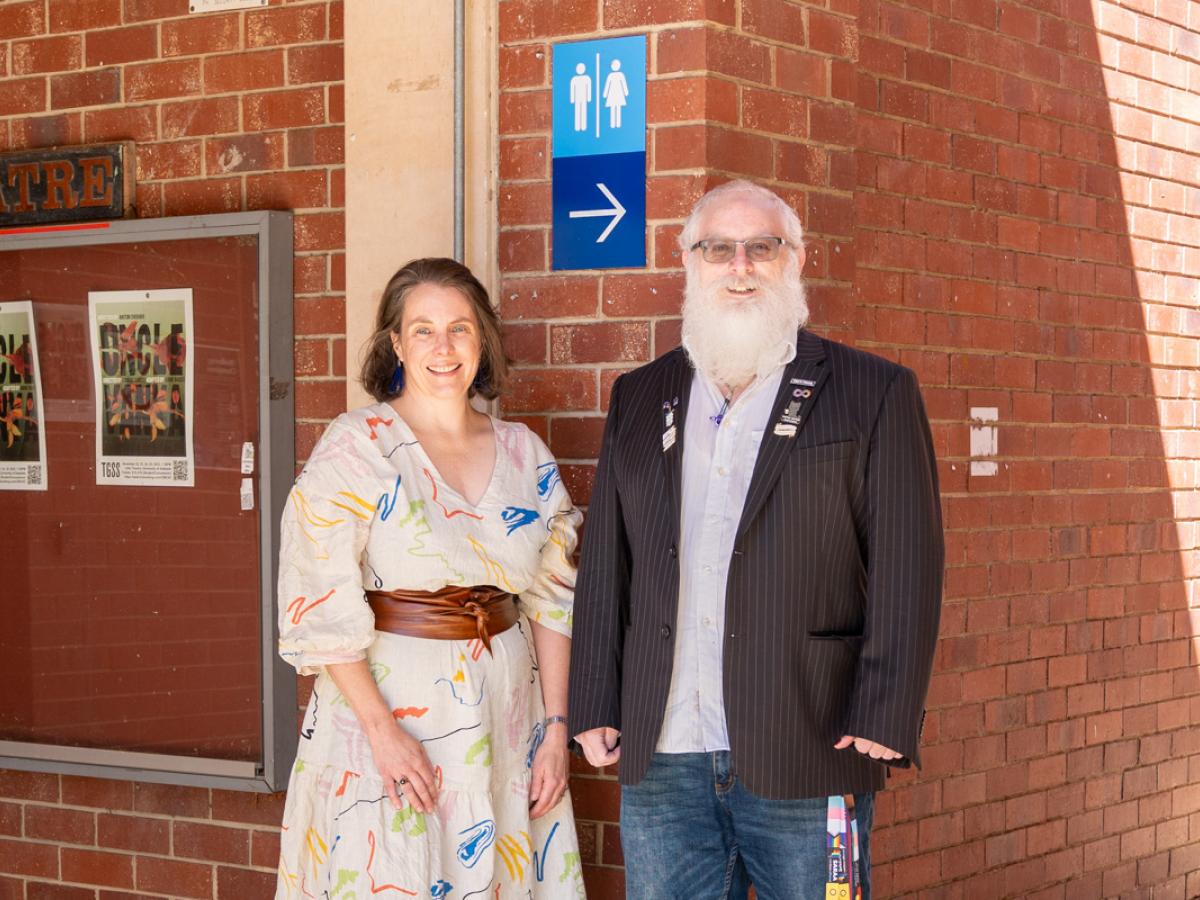Making campus more accessible one toilet at a time
Introducing sanitary bins to some male-designated toilets will make facilities at University of Adelaide more accessible for trans men and people who use incontinence products.

Anne Hewitt and Loki Maelorin on the University of Adelaide's North Terrace campus.
Associate Dean Gender, Equity, Diversity and Inclusion, Anne Hewitt spearheaded the change, and says by making sanitary bins more accessible, the University of Adelaide is complying with state and federal prohibitions of discrimination.
“Thinking about how the absence of appropriate sanitation facilities might affect trans, gender diverse and disabled people is important,” says Anne, who researches equality and prohibitions of discrimination.
“We want to encourage full inclusion of a diverse community of staff and students on University of Adelaide campuses, and failure to provide services that enable this may amount to prohibited discrimination under both state and federal legislation.
“This is a simple solution that will help many individuals feel supported when coming to university, and one I hope other universities and institutions copy.”
Post-graduate student and Gender Officer of the University’s Pride Club, Loki Maelorin, was also involved in the initiative, with the duo contributing to a Queensland University of Technology briefing paper on how the introduction of additional sanitary bins would improve the campus experience for staff, students and visitors.
“No one should feel they have to disclose healthcare needs just to be able to use toilet facilities,” says Loki, who is non-binary and a Committee Member for the Disability, Injury, and Divergence Association.
“Providing and maintaining a sanitary bin that is accessible in spaces not previously considered ‘necessary’ quietly expands the comfort and dignity of people in any organisation.”
While accessibility and inclusivity improvements are often treated as a niche concern, 13 per cent of Australians under 65 and 51 per cent of Australians over 65 have a disability.
“About one quarter of our population will experience a disability in their lifetime,” Loki says. “It’s also important to recognise that anyone, at any time, could become someone who needs additional support and resources.”
The University of Adelaide is continually building and supporting its diverse and inclusive community, which presents a skillset and knowledge base the institution can draw from when implementing new accessibility infrastructure.
“We need to include more diverse people in decision-making and the development of the basic infrastructure of the spaces and places we all live in,” Loki says.
“There are a lot of insights about how the design of spaces, and the inclusion of various facilities, could be adjusted that would make everyone’s lives just a little more liveable and enjoyable.”
Loki hopes more organisations will introduce sanitary bins to male-designated toilets, and would like to see broader societal acceptance of such initiatives.
“Many large public venues have begun desegregating their toilet facilities, which improves the experience for women and non-binary people – and it could start to destigmatise the bins through plain old familiarity,” they say.
“I would like to see more organisations take up the opportunity to improve the care and hygiene they provide in their facilities.”
Media contact:
Loki Maelorin, Gender Officer, Pride Club of University of Adelaide. Mobile: +61 0414 908 505, Email: loki.maelorin@student.adelaide.edu.au
Associate Professor Anne Hewitt, Associate Dean of Gender, Equity, Diversity and Inclusion, Faculty of ABLE, University of Adelaide. Phone: +61 8 8313 4453 Email: anne.hewitt@adelaide.edu.au
Johnny von Einem, Media Coordinator, The University of Adelaide. Mobile: +61 0430 476 300, Email: johnny.voneinem@adelaide.edu.au
